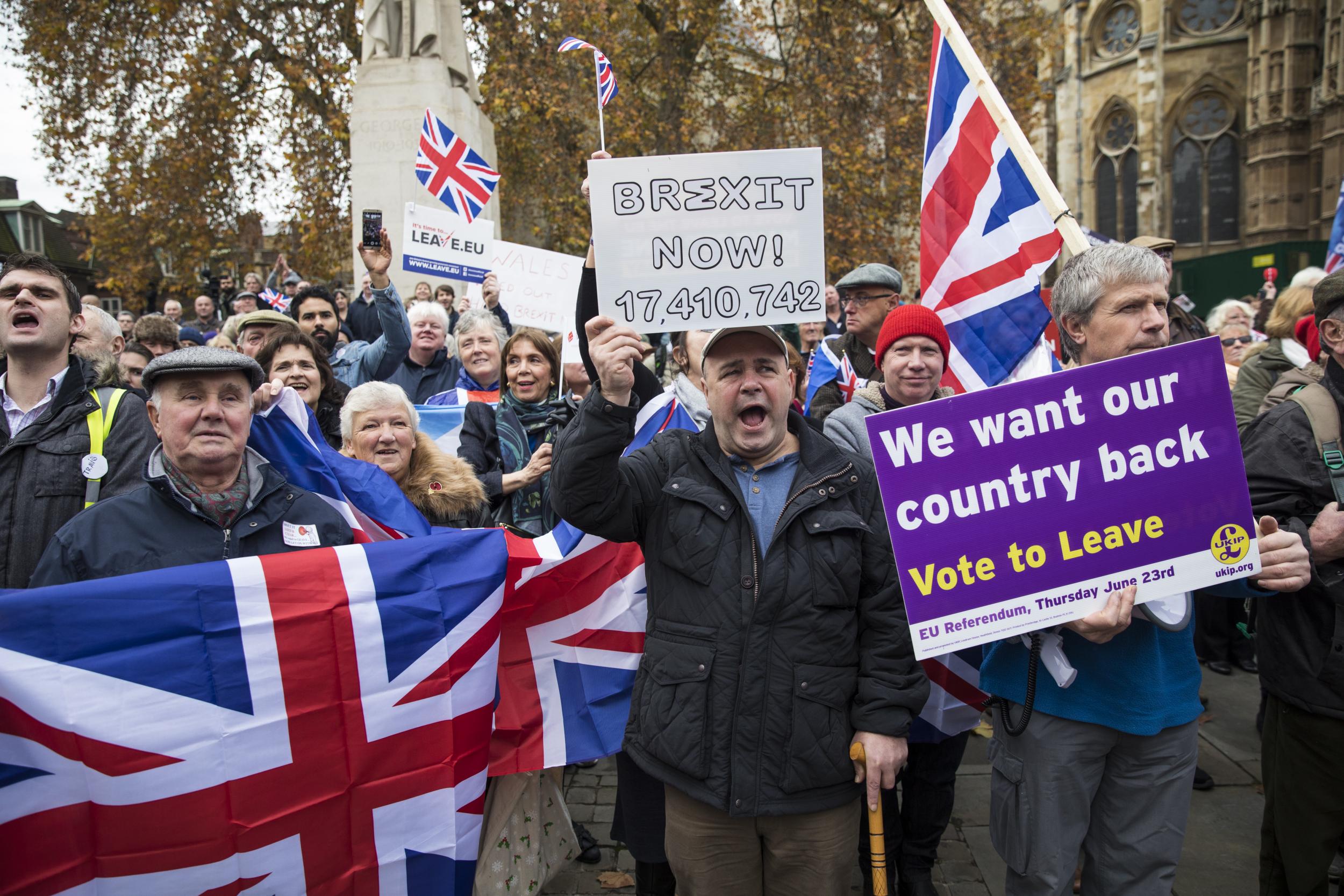Your support helps us to tell the story
From reproductive rights to climate change to Big Tech, The Independent is on the ground when the story is developing. Whether it's investigating the financials of Elon Musk's pro-Trump PAC or producing our latest documentary, 'The A Word', which shines a light on the American women fighting for reproductive rights, we know how important it is to parse out the facts from the messaging.
At such a critical moment in US history, we need reporters on the ground. Your donation allows us to keep sending journalists to speak to both sides of the story.
The Independent is trusted by Americans across the entire political spectrum. And unlike many other quality news outlets, we choose not to lock Americans out of our reporting and analysis with paywalls. We believe quality journalism should be available to everyone, paid for by those who can afford it.
Your support makes all the difference.Post-Brexit Britain is in the throes of a major backlash against globalisation, blaming dwindling wages and rife inequality on the opening of the world’s economy, an exclusive poll for The Independent has revealed.
The survey by ComRes even exposes a new backward-looking dislike of modern technology in the UK, with the public blaming advances for a widening gap between the rich and poor.
People believe the gap has also been widened by the low interest rates championed by former Prime Minister David Cameron and his Chancellor George Osborne and employed by governments in many countries now suffering resurgent populist movements.
The poll of more than 2,000 people in the UK sheds new light on how Britain sees the world in the wake of its vote to quit the European Union.
For many years globalisation was seen by Western political leaders as the key to unlocking prosperity and development, but the tides of public opinion have now firmly turned against it, the survey shows.
Firstly people were asked which of two statements on globalisation they agreed with, whether it has “pushed wages lower for British workers” or “has not pushed wages lower”.
Almost half, 49 per cent, believed pay packets had been deflated by the global trend, while 23 per cent did not think they had and 29 per cent did not know.
Asked whether globalisation had led to “more inequality between rich and poor”, 51 per cent agreed, while just 21 per cent opted for the opposing statement and 29 per cent did not know.

Opinions were less clear cut when it came to employment, with 38 per cent believing more jobs had been created by globalisation, 31 per cent thinking it has led to fewer jobs and 31 per cent unsure.
Ukip’s Nigel Farage and US President-elect Donald Trump both won major political victories after fighting on anti-globalisation tickets, lambasting a metropolitan liberal elite that they claimed was more concerned with international affairs than people in their home countries.
With their message chiming in areas of post-industrial decline, it is perhaps no surprise that the poll also shows people blame modern technology for inequality.
Some 40 per cent agreed that “technology is widening the gap between rich and poor in Britain”, while 32 per cent disagreed and 28 per cent did not know.
The outcome is particularly worrying, given that it will be high-tech industries, requiring well-trained tech savvy new workers, that will help the UK compete in the global market.
A majority of 51 per cent also blamed low interest rates for having “helped the rich get richer while the poor get poorer”.
Historically low rates were a major weapon in George Osborne’s arsenal as he tried to keep the economy afloat in the wake of the 2008 crash.
But in her speech to the Tory conference this year, Prime Minister Theresa May claimed the Bank of England’s low interest rate policy had “some bad side effects” on pensioners, savers and the young.
The comments spawned a row with Bank of England Governor Mark Carney, who went on to accuse politicians who blamed central bank policy for inequality as engaging in a “massive blame-deflection exercise”, but voters appear to have now sided with Ms May.
The US, where Mr Trump recently stormed to power, and eurozone nations have also undergone a period of unusually low interest rates in a bid to shore up economic performance.
ComRes interviewed 2,040 GB adults online between 7 and 8 December 2016. Data were weighted to be demographically representative of all GB adults and by past vote recall. ComRes is a member of the British Polling Council and abides by its rules

Join our commenting forum
Join thought-provoking conversations, follow other Independent readers and see their replies
Comments